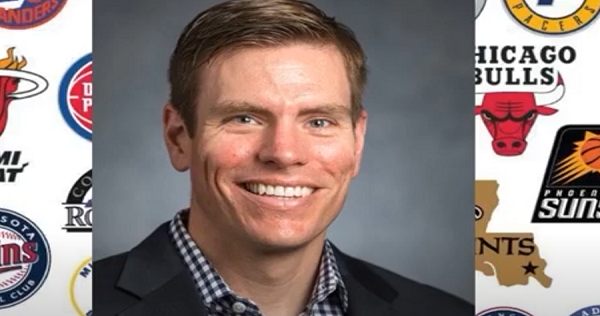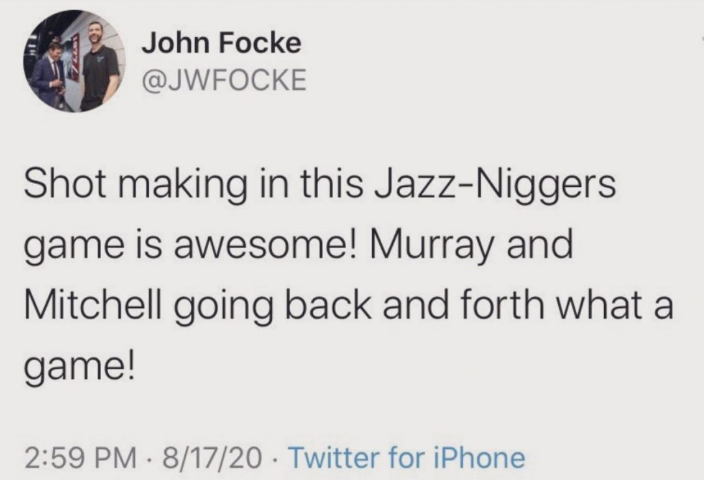
As the NBA reaches a crescendo of slam dunking lackadaisical defense with teams slugging it out in the bubble, the world got a rare insider view of Covid-19 professional sports, and how voracious the politically correct police in canceling anyone and everyone with a differing opinion. In a narrative that shrieks two wrongs don’t make a right, Charlotte Hornet’s broadcaster John Focke, committed a societal and social networking sin by tweeting a racial slur, and only exacerbated his demise by claiming that the word was a typo.
For his use of the n-word, the kangaroo court of social justice warriors has sentenced the now suspended radio broadcaster to life with out parole in Seattle’s infamous Capitol Hill Organized Protest territory or CHOP. He is expected to serve the majority of incarceration as a whimsical street performer dressed in striped pants and suspenders cagily guarding three jars of urine.

It’s bad enough that Focke committed an inexcusable blunder, was promptly disciplined by the Hornet’s management, and is now public enemy number one is every activist circle on this side of Wuhan, however, his insistence that the slur was the result of a typing error does not make a lick of sense, unless the term was previously used in a private texting conversation. The metamorphosis of professional basketball into an apologist anti-law enforcement political action committee of iconic one percenters, leaves no margin for mistakes, and tests the patience of even the most loyal sports in representing the volatile and intolerable mixture of athletics and politics.
As the tech realm has unleashed self-driving vehicles to the world, the brainiacs have also bestowed the cruel gift of autocorrect onto PC’s and smart devices a hair pulling software conundrum that wastes countless magnitudes of time and energy in explaining to a love interest how “dear” became “dead”, or “dimple” was morphed into “nipple”.
In all probability, the n-word was probably stored on Focke’s iPhone device after being used in texts or emails, as nowhere in the lexicon or the politics of tech culture would autocorrect automatically default to a racial slur or profanity laden tirade. And this is where things get messy, as the First Amendment faces another challenge from the continuous redefinition of societal mores.
Obviously, Focke screwed the pooch royally by failing to proofread his tweet, but his intent was probably 99.9% not ill-willed in catering to a general sporting audience by describing two players performing at a high level. However, the simple detective work researching autocorrect and the conclusive evidence pointing to the fact that he most likely was engaged in texts back and forth transforms a simple innocent mistake into a complex debate. In this modern nightmare of fleeting accountability, at least for the time being, actions still have consequences, and while basic rights and freedoms hang in the balance, the trendy hipsters lurk in the electronic hinterlands, ceaselessly commenting and snarkily admonishing contrary viewpoints with a pretended brevity and false sense of entitlement akin to an introvert temporarily ruling the night club scene hopped up on liquid courage. The emotionally charged and instant gratification response leans towards the extremists and involves a wooden stake, gasoline, and a length of rope. The caveat and prodigious asterisk describing this environment of false bravado, is that none of the peanut gallery mob collection of “Karen” social media complainers, has the guts to confront an individual in such a manner in real life.
This will be interesting to see how this plays out, as public figures are held to a different standard of free speech, and are not protected by the legal statutes of libel or slander that is applicable to most citizens. With the frequency of radical groupthink judgement interpreted through insinuation rather than fact, and the increasing prevalence of subjectivity, the proportionality of a reasonable expectation for privacy disintegrates. The presence of social networking sites encouraging snap judgement emotional interactions only further muddies the waters of how society differentiates between conversations suitable for the privacy of the home and dialogue appropriate for a public setting.
—
This editorial powered by Duckduckgo.com